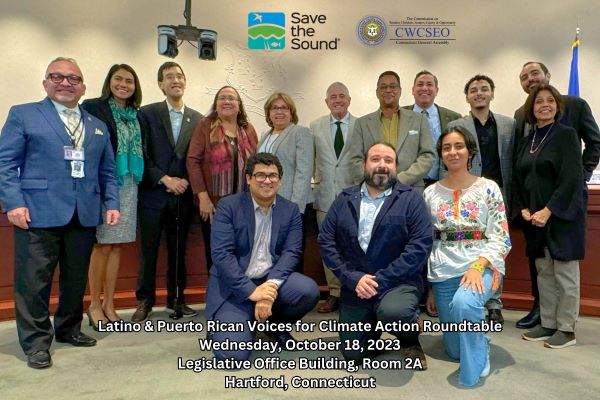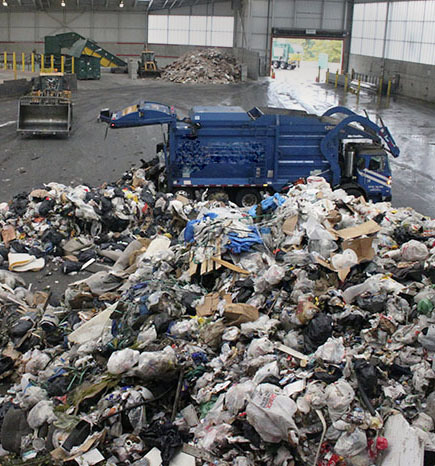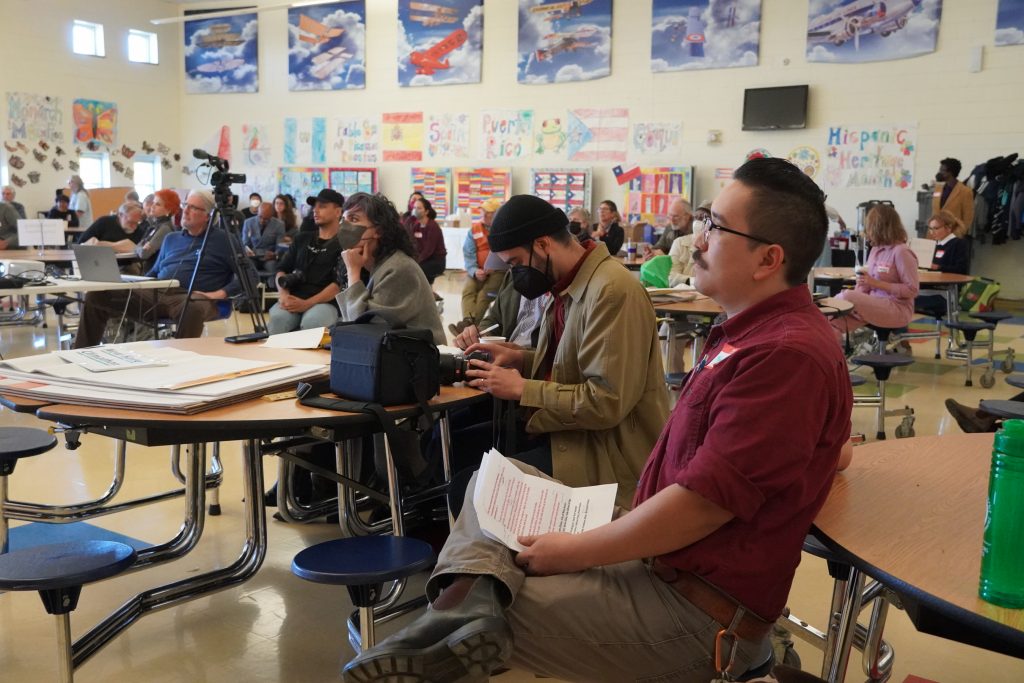
Introducing guest blogger Analys Torres, a 2nd year Master of Public Administration Student at the University of Connecticut School of Public Policy. She is passionate about the intersections of social justice, health, and environmental conservation and has joined Save the Sound as an environmental justice policy intern for the Fall 2023 and 2024 Spring semesters. Analys has authored this blog to address representation in today’s advocacy movements in hopes that it will support those who are looking to get involved.

On October 22, 2023, my supervisor Environmental Justice Specialist Alex Rodriguez and I, along with the Connecticut Commission on Women, Children, Seniors, Equity, and Opportunity (CWCSEO), convened a Latino and Puerto Rican Voices for Climate Action Roundtable that featured community leaders, academics, legislators, and government officials of Latin American ancestry to address how climate change impacts Latine communities in Connecticut and how to combat the issue.
Hearing from these professionals, I was impressed with their solutions; one panelist highlighted the importance of investment in cultural and bilingual communications to welcome more Latine peoples into the environmental space. Another emphasized meeting community members where they are to learn and respond to their lived experiences and demands. Authentic collaborations, such as holding an artistic workshop or participating in a neighborhood revitalization zone (NRZ) meeting, help ensure the community is better and stronger. These solutions, among others highlighted in the roundtable, support equal representation in the environmental space.
Representation plays a pivotal role in the progress of any mass movement for societal causes because it is vital that the lived experiences of those most affected be heard when demanding system change. Groups that are among the most engaged in environmental and social justice movements include youth and Black, Indigenous, and people of color (BIPOC): people who hold these identities are typically “on the frontlines” of these issues, and 60% of today’s youth and over 70% of BIPOC ethnicities nationwide have participated in a civic action such as attending rallies, volunteering, and donating to community groups. However, young people and BIPOC people are still underrepresented in key decision-making roles.
Many factors contribute to lack of representation from BIPOC peoples in environmental events and decisions, including language barriers and lack of access to resources. This leaves them vulnerable when industry officials vie to site affecting facilities, such as power plants and related facilities, in state-identified Environmental Justice Communities/Disadvantaged Communities. These facilities impact public health in all communities yet are concentrated in low-wealth urban communities and communities of color of all income levels.

A notable example occurred in 2018 in the South End of Waterbury, CT, a predominately Latine neighborhood, where a waste company called F&G Recycling applied for a permit to expand a waste facility in a neighborhood that was already overburdened with a high number of polluting facilities. Residents had previously taken issue with the company’s lack of bilingual communications and engagement to inform the community about their project, and voiced their opposition to the expansion of the facility. Despite their opposition, former Mayor Neil O’Leary agreed to a settlement restricting the company to receive daily shipments carrying 75 tons of recyclables and 275 tons of trash at their South End facility. This was a grave example of environmental injustice.

Representation in decision-making processes brings light to the issues in our community, and that can lead to the justice we seek. It’s our job to practice equity as often as we speak about it, and that should come with sharing of resources with the most vulnerable among us. This will help them become more engaged and to use their voice effectively. Inclusion of youth and BIPOC communities in decision-making processes supports an equitable future for us all.
Here are some ways to make an impact for a more representative environmental movement:
- Support Legislative Action: Join Save the Sound in Albany or
Hartford for in-person advocacy days during the 2024 legislative sessions to
support legislative action that will protect our region’s environment. And if
you can’t join us in person, don’t worry! You can make an impact by calling legislative
offices or clicking on our action alerts.
- Educate Yourself: Take the time
to learn about the intersectionality of environmental and social justice
issues. A great place to start is “The Intersectional History of
Environmentalism”
by Intersectional Environmentalist.
- Engage in Community Initiatives: Participate
in local community projects that address environmental and social issues
through an inclusive lens. For example, Save the Sound leads an annual Connecticut
Coastal Cleanup effort from August through October where we work
with volunteers to keep plastic and other trash out of Long Island Sound.
- Vote for the Environment: Participate in local, state, and federal elections. Research political candidates’ stances on the environment and intersectional concerns, in addition to any referenda questions that may appear on your ballot.
Collective action is powerful. By taking these steps, you contribute to a more representative environmental and social justice movement.
